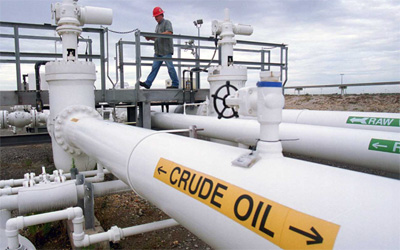DoE Authorizes Exxon To Tap SPR To Avert Refinery Disruptions
Tyler Durden
 As Trump officials signal plans to refill the Strategic Petroleum Reserve (SPR)—drained under the Biden-Harris regime—a new report reveals that ExxonMobil has begun drawing from the SPR due to contaminated crude supplies from offshore rigs in the Gulf of America to avoid refinery outages. As Trump officials signal plans to refill the Strategic Petroleum Reserve (SPR)—drained under the Biden-Harris regime—a new report reveals that ExxonMobil has begun drawing from the SPR due to contaminated crude supplies from offshore rigs in the Gulf of America to avoid refinery outages.
Bloomberg reports Exxon is borrowing up to 1 million barrels of crude from the SPR due to quality issues with Mars crude — a Gulf of America oil grade contaminated with high levels of zinc, which can damage refinery equipment.
According to sources, Exxon has been forced to reduce production at its Baton Rouge refinery and attempt to resell Mars crude cargoes in the spot market.
Here's more from Bloomberg:
The quality issue has forced the refinery cuts at Exxon's facility in Baton Rouge, one of the people said. And the company is now trying to resell cargoes of Mars crude in the spot market, the people said.
The oil, which is typically used by Exxon's roughly 520,000 barrel-a-day Baton Rouge refinery, is for delivery this month at the St. James terminal, a major storage hub in the Pelican state, the people said.
On Friday, the Department of Energy (DoE) confirmed a SPR loan of up to 1 million barrels was made to Exxon due to its "logistical challenges impacting crude oil deliveries to the company's Baton Rouge refinery."
DoE provided more details about the situation:
Under the exchange agreement, DOE will provide up to 1 million barrels of crude oil from the SPR. The exchange will support ExxonMobil's restoration of refinery operations that were reduced due to an offshore supply disruption. ExxonMobil will return the borrowed crude along with additional barrels of crude oil for the SPR at no cost to the taxpayer.
The Department remains in close coordination with industry partners to ensure stability in the fuel supply chain during the peak demand season. DOE continues to encourage refiners to prioritize efficient production and delivery of refined fuels, stands ready to support the nation's energy security through the responsible use of strategic resources, and will continue to deliver on President Trump's commitment to protect American energy security by refilling the SPR.
The DOE's SPR loan to Exxon is aimed at preventing outages at the Baton Rouge refinery, one of the largest in the U.S. and a key part of the nation's fuel infrastructure. Any throttling of supplies or even a shutdown would trigger immediate disruptions in gasoline, diesel, and jet fuel supply, with the Southeast and Mid-Atlantic regions hit hardest.
 our mission: our mission:
to widen the scope of financial, economic and political information available to the professional investing public.
to skeptically examine and, where necessary, attack the flaccid institution that financial journalism has become.
to liberate oppressed knowledge.
to provide analysis uninhibited by political constraint.
to facilitate information's unending quest for freedom.
our method: pseudonymous speech...
Anonymity is a shield from the tyranny of the majority. it thus exemplifies the purpose behind the bill of rights, and of the first amendment in particular: to protect unpopular individuals from retaliation-- and their ideas from suppression-- at the hand of an intolerant society.
...responsibly used.
The right to remain anonymous may be abused when it shields fraudulent conduct. but political speech by its nature will sometimes have unpalatable consequences, and, in general, our society accords greater weight to the value of free speech than to the dangers of its misuse.
Though often maligned (typically by those frustrated by an inability to engage in ad hominem attacks) anonymous speech has a long and storied history in the united states. used by the likes of mark twain (aka samuel langhorne clemens) to criticize common ignorance, and perhaps most famously by alexander hamilton, james madison and john jay (aka publius) to write the federalist papers, we think ourselves in good company in using one or another nom de plume. particularly in light of an emerging trend against vocalizing public dissent in the united states, we believe in the critical importance of anonymity and its role in dissident speech. like the economist magazine, we also believe that keeping authorship anonymous moves the focus of discussion to the content of speech and away from the speaker- as it should be. we believe not only that you should be comfortable with anonymous speech in such an environment, but that you should be suspicious of any speech that isn't.
www.zerohedge.com
| 

